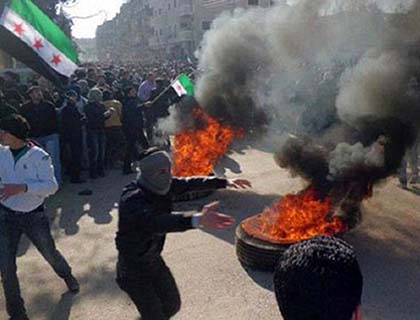The Arab league unintentionally spoiled another move towards ending the civil war in Syria. On Monday, United Nations Secretery General, Mr. Ban Ki-moon asked all sides to stop supplying arms to either side, a call that shows that he does not maintain that supporting oppositions would be of any help to Syrian government unlike many other regional and Western countries.
While talking with Arab League Secretary General Nabil Al Arabi and Qatari Prime Minister Shaikh Hamad bin Jassem Al Thani, Ban pleaded for a halt of arm supplies. ‘The secretary general called for stemming the supply of arms to any side in the Syrian conflict. More arms would only mean more deaths and destruction,’ said UN spokesman Martin Nesirky.
But Mr. Al Arabi, rejected the call when he later spoke to reporters. ‘If there is a political settlement or a beginning of a political settlement, that could happen but at this point I don’t think it is possible”. Similarly the Arab League Chief said, ‘The government is getting arms from certain parties so if the other side gets some arms from certain parties I think you can get some form of a balance there”.
The two highly qualified and veteran diplomats commissioned by United Nations to find a solution of the problem have bluntly failed. Previously Mr. Kofi Annan the former Secretary General to UN, after serious efforts to end violence, stepped down. Subsequently, Mr. Lakhdar Brahimi was appointed as UN special representative to find a solution to the problem, yet he gained no success.
Presently there are talks about his possible resign. So, if he follows the step down of Kofi Annan that would mean another blow to diplomatic force of the United Nations in resolving conflict in addition to record of failure to the profile of two outstanding diplomats.
In think the problems lies in the reality that continuous war has burnished and polished the fronts and wings of supporters and oppositions. Earlier many countries were wandering between the two sides and had no idea or interest to either side. Now the friends and enemies of the government as well as oppositions are clear, and countries have decided to determine where they are standing. Now the failures of one side does not mean the failure of Syrian group but the failure of larger wing stretching to countries and groups far beyond the border of the country. So countries who lined up whether behind oppositions or government, they will leave no stone unturned in order to win over the other side.
In other words, there is proxy war going on. Many countries have kept feet on the accelerator to accelerate the collapse of the regime without considering the consequence of such an action.
While rebellions have the strategic support of Western countries and Sunni Arab nations, Assad’s regime remains as redline for foreign policy of Tehran.
At the international level, China and Russia still support and prevent backbreaking resolution against the regime. When the uprising started more than two years ago, it got the global attention and nations voiced support to demonstrators. As well, the time was ripe and much exposed to change, because the wave of the so-called spring was tough enough to challenge the pillars of all regional authoritarian regimes.
From the very start, the regime responded with clenched fist and branded them as terrorists. The
regime showed no flexibility against demonstrators and used all its force to suppress them.
Tehran has been supporting President since the very start of civil uprising. The supreme leader who is the ultimate decision maker in the Iran, Mr. Ayatollah Ali Khamenae often openly voiced out support for Damascus regime while condemning other regimes reacted similarly in the case of uprising breakout. While insisting that Arab countries are affected by more than 30-years old Islamic revolution in Iran, he links civil unrest in Syria to foreign intervention.
Therefore, the so-called proxy war and the dominant presence of Allawites, a minor who can hardly be branded as part of Shiite group, have further complicated the situation.
According to the United Nations reports, around 70000 people are killed since the start of uprising more than two years ago and millions fled the country. The Syria of yesterday does bear any similarity of today. It is completely ruined and law enforcement has become like a dream for civilians.
At many places, people have nowhere to go to claim their rights. According to reports, in areas under the control of rebels, persecutions are made without any normal legal procedure. Moreover, there is an obvious crack among the front of Anti-Damascus regime too. However, all to some extent want to see the collapse of Assad regime, but the gap among them about who should take power will not be smaller than their views about the Assad regime’s destiny with its supporters.
The Al-Nasurat group openly announced its linkage with Al-Qaeda. Their main enemies are not just Assad but their entire secular regimes, particularly Western countries. However, such groups may accept the arms supplies from Arab and perhaps Western countries, but their goal is clear and indisputable.
The Arab countries and Turkey who have all come together under the umbrella of toppling President Assad recently their differences have crept up. For instance, Saudi Arabia dislikes the empowerment of Syrian Muslim Brotherhood and supporting other groups. Such differences however is overlooked due to barbaric violence in Syria but if Assad’s regime collapses, the civil war will start as happened in Afghanistan after the collapse of Dr. Najib’s government.

